Sometimes things just start with a friend.
“My really good friend in school when I was about 7 started playing soccer, so I signed up, just to take part and really soon after just started to enjoy it.”
It’s a little frustrating to hear that a professional soccer player started playing the game so, well, randomly. Here is someone ostensibly living a dream, and it all started off with an “I guess I’ll do that.”
“If it had, by default, been an instrument or a different sport I think I kind of just would have gone with it.”
Of course things aren’t always as they seem. Yael Averbuch was a child doing what children do. What truly emerges when talking to the FC Kansas City midfielder is an admiration of what clearly sets her apart, and did so even at a young age: a drive for self-improvement, even when where she stands or where she is going is not clear.
But, as of right now the path in front of her is excruciatingly clear: her and her Kansas City teammates just won the 2015 NWSL championship game and she has big things in mind for Kansas City, the NWSL and women's soccer. She has spent the better part of the past year working towards this game, this goal, this win.
"It's obviously an amazing accomplishment to win a championship in any league or any setting, but to be able to defend that...I think that's where you really start to establish dominance."
Today, the day after FC Kansas City's NWSL Championship win, is a happy day with the finish line behind her and the potential for even greater things ahead of her.
The first time we spoke was, though, it was midseason and things weren't as clearly in focus. She hadn't just knocked on the door of victory and had it open and let her in. That’s not to say she was at all negative; she was just in the middle of her season; she was just somewhere in between.
I am talking to her on the phone. With the aim of understanding how she became the woman and player she is today, we start with her childhood. As she talks, this theme of being “in between” appears, although that’s not exactly strange. Few things describe childhood as accurately as not being sure of yourself, but at the same time believing in things wholeheartedly; it’s the blessing and curse of self-discovery.
“I liked being part of a group and being competitive within the group, and…trying to work with my teammates to achieve something. But I also liked that I could take away elements of that and work with them on my own because, for me, I’m not naturally a very social person. So, if I can do something on my own, or be self sufficient in certain ways, that’s very enjoyable to me.”
She is talking about what drew her to soccer as a child. For all of the ambivalence that might have been there, there is no denying that she enjoyed the game from the start, and quickly began to love it. As she has a habit of doing, Averbuch then summarized her previous point quite well.
“The combination in the sport of the element of individual mastery combined with the team effort.”
Not that the 7-year-old Yael Averbuch would have been able to put it that way; she doesn’t hold any reservations that she would have. But the underlying feeling is that, in soccer, she had found the perfect game, even if she might not have known it until years later.
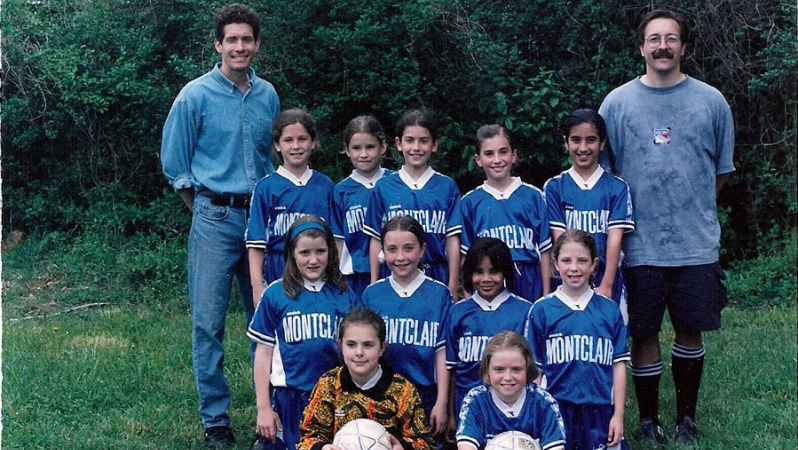
Yael Avernuch (center, standing) as a child with a youth team. Photo: yaelaverbuch.com
With her natural attraction to the game, Averbuch’s talent blossomed quickly. If she entered the sport in just about the most average way a 7-year-old could, she quickly left the rest of the average 7-year-olds behind.
“It was something I started to take part in. So naturally I wanted to learn all about soccer. I wanted to know the best things to do to get better,” she says. “It became almost an obsession, but in a good way.”
As she dived into the game she loved, it became clear that she would want to do nothing else. This is not surprising when she tells you about her parents. Both long distance runners, they showed her what it meant to be disciplined, to have goals and what it takes to achieve them; how something must be worked at and strived for every day. They were used to pushing forward when the goal always seemed ridiculously, even demoralizingly, far away.
It's not to say that she mechanically pursued soccer, precise and calculating in all that she did. She was disciplined, but still a child. She had ambition, but it was by no means an exact science when it came to deploying it.
When it became clear that she had surpassed her age group and that local teams were not going to provide the challenge she needed, she and her parents had decisions to make. Would they drive over an hour to an elite club? Would they hire a personal coach? There were many options that lay ahead of a young Yael Averbuch, and she and her parents just might have picked the most obscure of them all.
“What I did was very intentional and disciplined in the sense that I wanted to put myself in the best environment to get better. But at the same time, the road to do that was not always very clear. So there was a lot of — not even trial and error, but a lot of trial basically.”
What she did was join an all-boys team at the age of 11. It was the kind of decision that she would come to take pride in later, but back then it was just scary, awkward, and hard — but she was up to it.
“I think, honestly, I was just very competitive. In the sense that I wanted to win but also that I wanted to feel like I was contributing…I didn’t wanna just be the token girl who was 'good for a girl,' so she was on the team. I wanted to be respected, and I wanted to be thought of as somebody the team needed to win.”
And she would need to show that she deserved respect. She was the outsider, she says, someone who always had to fight to show that she belonged, and she put an incredible amount of pressure on herself to do so. Or at least that's how it seems to her now.
“At the time I don’t know if I realized that [I was putting pressure on myself]. I was kind of just along for the ride.”
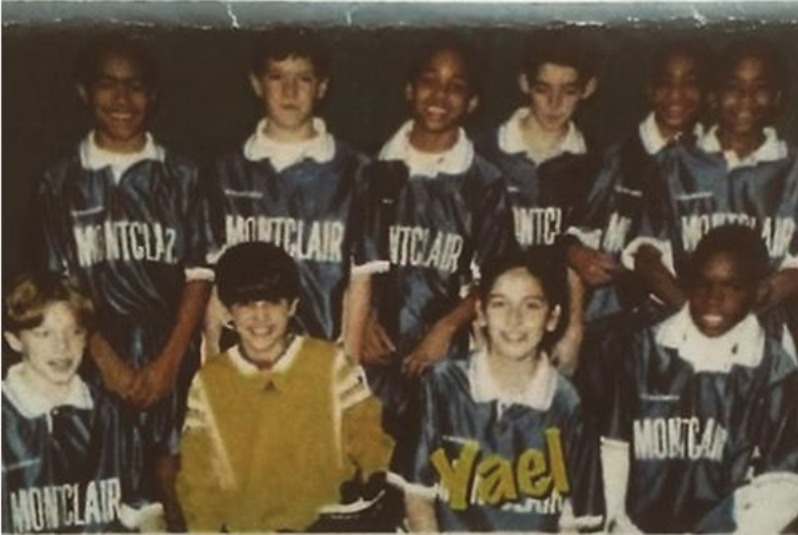
Yael with the all boys Montclair Mavericks. Photo: @yaelaverbuch | Instagram
Perhaps that was fortunate, perhaps it was not. Averbuch herself still thinks about the virtues of joining that boys team. On one hand, it hardened her. She laughs as she reminisces about psyching herself up at a National Team camp later in her life with the thought, “OK, you can handle this. You’re nervous, but even these nerves don’t compare to how I would feel when I played for that boys team.”
But on the other hand it taught her how to play the game with players that were stronger and faster. That developed precise technical ability, but may have stunted her growth, she thinks, in other areas.
“I was never realistically, especially at the age where I played where they were just kind of hitting puberty, I was never going to be a dominant player on the team.”
“In some ways it was hard for me to go back to playing with girls and being the, like, being a leader, or imposing myself on the game and kind of being effective.”
It was an ironic twist. She emerged from her time on that boys team an extremely good player, but not necessarily a player that could grab a game by the horns.
“It’s easy to play on and two touch, and not lose the ball necessarily, but then it’s another thing to take some risks going forward and get off some dangerous shots and really impact the play.”
If realizing this was demoralizing, she doesn’t let on. If anything, by the end of our conversation it hardly stood out. Not that it's surprising, because it hardly held her back as a young player.
Yael Averbuch would go on to feature for the U16, U17, and U19 US Women’s National Teams. She would forgo high school soccer for more elite appearances at the club level. She even made an appearance in the W-League at the age of 14. Her upbringing in soccer was anything but normal, and she prides herself on that.
“Having confidence to make decisions like [not playing high school soccer]…has been something that’s very scary for me but also, kind of, in a lot of ways, defines who I am as a player and how I fell about what I do.”
A midfielder always has to know where the space is. It sounds easy but it is not, and it is something that Averbuch must try to excel at every game. In a lot of ways, midfield is the soccer equivalent of judo, where you use your opponent’s momentum against them. You have to be comfortable and confident while out-matched or under pressure, and Averbuch’s upbringing made her just that. It wasn’t perfect, but it served her well, and it would be put to the test in the next stage of her career: college.

The University of North Carolina at Chapel Hill. Photo: @mattwhitney16 | Twitter
Yael Averbuch didn’t just go to a good collegiate soccer program when she chose to attend the University of North Carolina, she went to the best.
Since the inception of the NCAA Division I Women's Soccer Championship in 1982, UNC has won 21 women’s national championships; 10 more than the rest of the nation’s D1 collegiate women’s soccer teams combined. There is a further laundry list of impressive records and statistics, as well as alumni the likes of whom deserve their own hall of fame, but that championship record really says all you need to know. With such an impressive history, the university was on Yael’s radar since she was a child. More than that, she dreamed of going there.
She remembers watching old VHS tapes called “the dynasty series” and admiring the program’s head coach, Anson Dorrance, who had nothing but nice things to say about her competitors, who ironically only had horrible things to say about her. Similarly to how competitors tried to strip the luster from Dorrance, other universities would disillusion a young Averbuch about the University of North Carolina when she came of age. It wasn’t anything cynical and perhaps not even intentional, but by the time Averbuch made it to UNC, simply having seen what other universities could offer diminished the charm of what was a childhood dream.
“I was not as much of a fan girl by the time I actually showed up there, but at the same time it was pretty cool for me because it was a place I had dreamed of playing [at] since I was young.”
So she went to college as most people do, without something that had defined her as a child. It was a prelude to the maturing process that was to come. If she came to college one dream lesser, that was the only thing about her time at UNC that could be described as such. She was almost immediately overwhelmed.
Collegiate athlete after collegiate athlete will tell you about the spike in intensity and speed of play encountered when transitioning from high school sports to their collegiate counterparts. It is more so true at the highest level, Division 1, and more so still at the University of North Carolina’s women’s soccer program.
“It’s instilled in the feeling there. [Head coach Anson Dorrance] definitely pushes it along but I think just the whole system — the way everything is done; every single thing is recorded. There’s no way not to compete when you go there…honestly, training was harder than the games.”
And she almost wasn’t a part of those games her freshman year. She did indeed crack the starting XI as a freshman, but she only did so with a little bit of luck, and a lot of help from a lifetime spent in the middle of the pitch.
“It just so happened that the only spot on the team that wasn’t being occupied by a national-team-calibre player was the holding midfielder spot.”
With the never ending turnover of talent at a program like UNC’s it was possible, if unlikely, that Averbuch could have come to the program at the wrong point and been perpetually one player away from cracking the starting XI; it could have been an upperclassman preventing her from moving up and then a fresh-faced recruit talented enough to take her spot before she could even call it her own. But everything worked out for the better.
“I was surrounded by such ridiculous talent that they made it almost impossible for me to fail,” she says, and her play that year backs that up.
As a freshman, Averbuch scored the first goal of UNC’s season in her very first appearance for the team. She scored four goals and notched seven assists throughout the year, and was named to both the Soccer America and Soccer Buzz first-team freshman All-America teams. It was hard to ask for a better start to her collegiate career. Impressively enough, she would top it the very next year.
That she would do so was a testament to UNC’s ability to keep the talent coming in when seemingly insurmountable amounts of it are going out. After her freshman year, nine of the starting XI graduated. That was nine “national-team-calibre” players whose production, presence and leadership all had to be replaced. For most collegiate programs that would be a bridge too far. For head coach Anson Dorrance and the North Carolina Tar Heels, it was routine. A total of 13 incoming freshman were brought onto the team — almost half of its total of 28 players — and this was not a case of quantity over quality; the class boasted the likes of Tobin Heath and Whitney Engen.
“[I] was surrounded by some phenomenal players who were also very young…All I had to do was show them the ropes a little bit, and at the same time follow in the momentum of the older players who were still around like Heather O’Reilly.” Yes, the same Heather O’Reilly that recently featured for the USWNT at the 2015 World Cup.
On top of the talent and the tradition of winning, that 2006 Tar Heel team had something that many other teams spend entire seasons looking for, and often never find: a source of constant motivation. A few games into the season she and her teammates were introduced to a father and his daughter: a young girl who had cancer. Both were from Florida and massive fans of the program, and the daughter was made an honorary team member.
“That became a really inspirational thing…It made us all know that we were playing for something bigger than, ‘oh we just wanna win games.’”
But the team did win games, and a lot of them. After a 1-0 defeat in double overtime to then-ranked-9th Texas A&M, the 2006 Tar Heels went on a historic tear, winning every single one of the 27 remaining games on their schedule; a feat that tied an NCAA record for the winningest women’s soccer season of all time, and gave the program its 19th national championship. It was a season Averbuch will never forget, and not just because of what she and her team accomplished on the field.
“At one point [that young girl from Florida] was doing really, really poorly…Her Dad told us that he promised her that if we made it to the final four they would make the trip up from Florida…I think the doctors told them they really shouldn’t do it. And so in our mind we were thinking, ‘Ok, we have to get there so that she can come see these games.’
“When we won she came out onto the field and was in a wheel chair and we were able to give her one of the championship shirts…It was about more than us that season.”
Averbuch was incredibly successful herself, as well. She scored 16 goals (including 7 game winning goals) and provided 7 assists, and was named Top Drawer Soccer Player of the Season, ACC Offensive Player of the Year, and was selected to the All-ACC first team. It was a stunning year, so stunning that it arguably had a paralyzing affect the next season.
“We had just come off this massive high and then a few changes here and there made it way more difficult for us.”
Averbuch failed to live up to expectations her junior year. She only scored 6 goals and provided 6 assists when she was expected to match her Offensive Player of the Year production of the last year. UNC never became the team it needed to be to have a successful season, and was knocked out in the third of the NCAA tournament. They, as Averbuch describes it, “set all kinds of records in all the wrong ways” that season. UNC lost its home opener for the first time, and set a record for most losses in a season in program history. Granted, “most losses in program history” constituted losing four games — again, UNC is no ordinary program — but Averbuch took the season as nothing less than a learning experience.
She remembers one game where UNC had multiple chances right from the opening whistle. It was going to be an easy win, or so she thought. But try as they might she and her teammates simply could not get the ball to go into the back of the net, and the opposing team rallied and scored at the very end of the game.
“It doesn’t just happen. You gotta create the right chemistry and still do everything right.”
Even in a program where everything is set up for success, from the constant influx of talent to the culture of winning, there is no escaping the human condition; people have imperfections, and left to their own devices imperfections have a habit of doing things that people don’t expect them to do. It is no coincidence that many realize this in college. It is a place where new challenges are repeatedly thrown in front of us in the classroom, in social settings, and, for people like Averbuch, on the field. They ostensibly have all the help they need to succeed; there are teachers and text books and study groups. But failure is never that far away. It’s a good thing, then, that college is probably the best place to fail. The next challenge, the next chance to prove yourself, is always in the next class, right around the corner, or in the next game.
It clicked her senior year. The 2008 team would go 25-1-2 (wins-losses-draws) overall, 9-0-1 in the ACC, win the ACC conference championship and be named national champions for the second time in Averbuch’s career. It was a return to form a year in the making, and the best sendoff that Averbuch could ever ask for.
“For me to go out of college soccer having won that last game was probably one of the best moments of my career.”
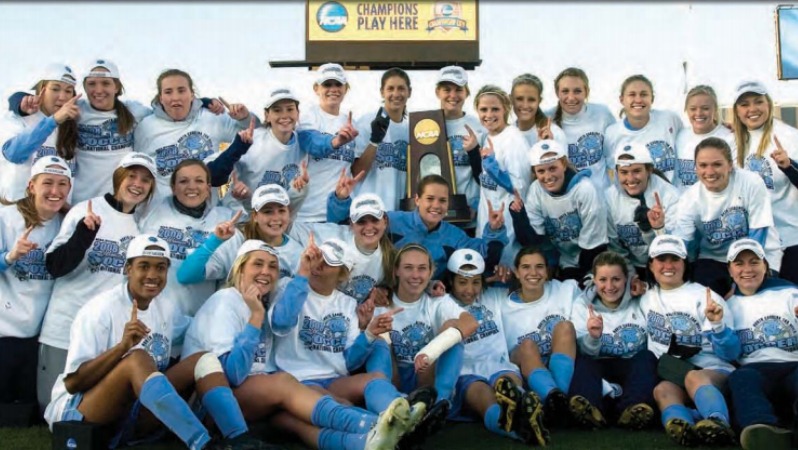
The 2008 National Champion Tar Heels. Yael Averbuch is center, immediately left of the trophy, standing. Photo: 2009 UNC Women's Soccer Media Guide
If one thing is certain as I talk to Averbuch on the phone in 2015, seven years after that championship, it is that she has grown to appreciate moments like that.
She has an appreciation of the present that allows her to reminisce about the past without getting lost in it. It speaks to a maturity born out of the kinds of experiences that define adulthood, to a realization that manufacturing motivation is not just something to be left to those who run national championship winning programs, but something that must be worked at everyday. It’s not cynical; in fact in might be one of the most hopeful philosophies a person can have. It comes from experiencing the one thing that all those collegiate failures and triumphs are supposed to prepare a young person for: the real world.
They say that you should find a job that you would do for free, and then make that your career. Whoever “they” are, most of them probably have never lived out their own advice to the extent that a women’s professional soccer player does. The women that partake in the NWSL are not given the salaries or attention that their male counterparts receive. In many ways, a player receives more support as a collegiate athlete than they do as a professional.
“At times it seems not even feasible or, honestly, a hardship in my life to play the sport and make it a viable career.”
All this is evident to Averbuch as a veteran of the league today, and maybe she had an idea of this reality in college or as she graduated. She is proud of where she stands now, and was probably proud of where she stood as she entered the 2009 Women’s Pro Soccer Draft. Averbuch was talented, a two-time national champion, and comfortable in her ability to transfer to play at the next level. “I left [UNC] feeling like I had played with and against some of the best players in the country.”
Her professional career got off to a fantastic start. She was drafted 4th overall by New Jersey’s Sky Blue FC. She started 14 out of 18 games her rookie season, assisted on the game-winning goal in the semifinal of the WPS playoffs, and wore the #10 as a starting midfielder in the national championship game, which Sky Blue FC won. By 2010 she had made 16 appearances for the senior USWNT (though she had yet to secure a regular spot on the team). At the age of 24 she had achieved three life-long dreams: playing soccer for the University of North Carolina, making it to the professional ranks, and being selected for the national team. But something wasn’t right.
“I thought, ‘What, is this, is this it? Is this how it’s supposed to feel when you accomplish all your dreams?’ It was a really bizarre feeling, because I was very confused, and I thought a lot about, ok, what’s the point of this all, because I definitely don’t feel satisfied."
It was not unlike what she had gone through her junior year, but it was different. Then it was achievement that had caused problems, that had made her and her teammates unable to rouse the kind of resolve and determination required to achieve success. Now it was success, but of a different nature; her success was hollow and lacked a feeling of achievement, and there was no denying it.
“‘I want to be so much better than I am right now,’” she remembers thinking.
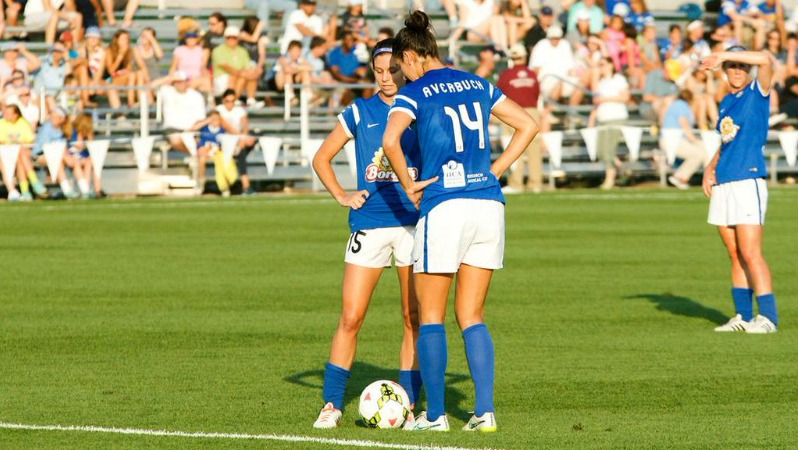
Yael Averbuch lining up for FC Kansas City. Photo: @BlueTestamentKC | Twitter
Life is cruelest when it strikes you down right when you think you have become the person you have always wanted to be — used to always want to be. Disillusionment is uncompromising and unavoidable. It enters into everyone’s life at one point; it either shatters, erodes, or does one and then the other. Arguments can be made about the virtues of being honest with yourself and the pragmatic benefits of denial, but this was no debate. Yael was honest with herself, and it allowed her to grow.
“I realized that whether I’m a starter on the National Team, or sitting on the bench for the club team — even thinking back to my youth days — it’s the same ups and downs you go through as a player. I would have great days. I would have bad days. [It didn’t matter that I had] checked off these long-time goals.”
“I realized that it’s an ongoing journey and that those ups and downs will always exist. You never get to the point where you are exempt from going through that.”
It isn’t very often that a reality check is turned into an uplifting experience. It takes strength and self-belief, and, perhaps more succinctly, a refusal to be held down. Yael could have chosen to give up. She could have let all of her shortcomings become reasons to quit. She could have thought that she was a fool ever to think that she could make it in soccer, that a woman could make sport a career. But she did not; she transcended all of that and kept her love of the game.
“Soccer is wonderful in my opinion because you don’t need wonderful facilities or a ton of space or whatever,” she says. “If you have your soccer ball, and you want to get better, and you have a vision or yourself playing in college and getting that opportunity. You can go make it happen.”
Those are the words of someone who is motivated, even inspired by what they do. There is nothing delusional about it. She is still the same player who is aware of her shortcomings, sometimes to the point of frustration. She has just accepted the player that she is. She has moved past the futility of despair.
“For me, some days I’m out there training and I think, ‘Ugh, if only I had the speed of like Alex Morgan.’ Well, yeah, but I just feel so fortunate that I’m healthy and able to run. So I think, often we have really stark reminders of [the bad things] in life, but if you’re able to keep [those good things] in mind, I think that’s a really important thing.”
There is a great quote for Alden Nowlan, a Canadian poet, novelist, and playwright, that goes a little something like this: the day children realize that all adults are imperfect, they become adolescents; the day they forgive them, they become adults; the day they forgive themselves, they become wise.
There is no guarantee that progression will occur in everyone. What Averbuch has gone through and the mindset that she has come out of it with is nothing less than inspirational. Disillusionment can ruin lives. A lack of motivation can end achievement and prevent dreams from becoming goals. Despite all of that, Yael Averbuch has become a young woman who understands the world of women’s professional soccer, chooses to live in it, and is actively trying to make it better.
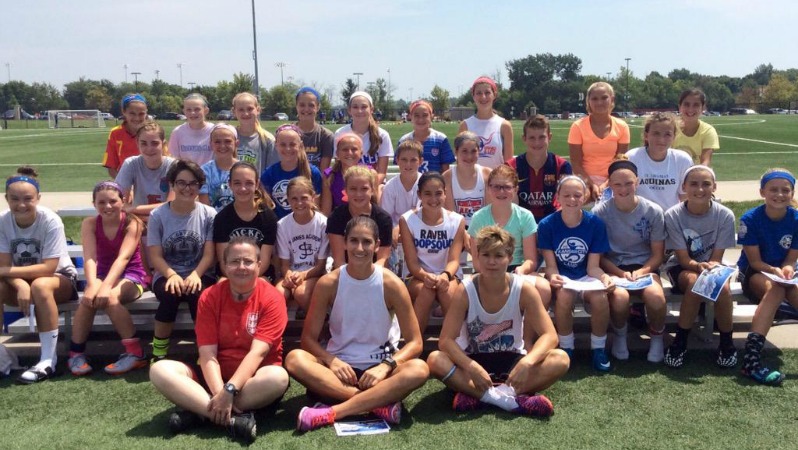
Yael Averbuch taking a picture with some clinic attendees. Photo: @Yael_Averbuch | Twitter
“I have put a lot of time and energy…and deep thought into carving out something for myself where I feel like I have a base of, not only income, but also something I feel good about doing in the soccer world.” That “something” has taken the form of teaching the game of soccer to young girls and women through camps, clinics, and training videos. She wants, whether it be on the pitch or off it.
“I think it’s important that we talk about aspects of sport with younger girls like believing in yourself, being confident, being strong and powerful and embracing those things as positives, and not something to be ashamed of, not something to shy away from, but important things to strive for.”
“It’s easier [than ever] for us to get caught up in wanting to be better than we are, being jealous of someone else, or especially now with social media, seeing someone else’s life and thinking it’s so cool. But, I think that what I would hope to share is that it’s so important to be grateful for what you do have and what you are able to do.”
It’s a gospel of independence and identity, and the coming generations of women’s soccer players are going to have to be independent and willing to forge their own identity if the NWSL is going to survive. As it stands, the league is not anything close to glamorous; there is no intrinsic status or popularity that comes with being a part of it. The players stay in it because they love the game soccer; they forgo the security of other vocations because they are strong enough to chase a dream in the face of a society that wavers back and forth between trivializing or ignoring that dream, and condemning it to failure.
"At the end of the day, whatever struggles we all go through to make this work – it's because we really do love our job."
Averbuch is practicing what she preaches when it comes to helping the next generation. She is open with her belief that the NWSL needs to connect with high powered women in marketing, PR, and business in general in order to help grow the league. Women helping women, although she never says it in as few words, and stepping up and leading when it is the unfashionable thing to do. She sees it as simply offering the next generation the sort of support she was lucky enough to have when she was young.
“I was empowered to reach my goal, so I would like to provide that type of experience for as many young females as possible.”
When a young girl goes to one of Averbuch’s camps, or tunes in to watch her play in the NWSL Championship Game, she sees someone that believes in her, even if she does not understand or recognize it at the time. That young girl deserves to interact with a person like Averbuch — needs to interact with a person like Averbuch, because doing so can be the spark she needs to do something special, whatever that something may be.
If Yael Averbuch’s story can tell us anything, it is that even the smallest spark can eventually lead to a crowd of brightly burning flames.
Follow Ivan on Twitter: @yetly
To learn more about Yael Averbuch and her journey, visit yaelaverbuch.com.
To learn more about how you can support women's soccer in the United States, visit our "Beauty Is A Beast" home page. We've created a scholarship fund that will go towards sending female high school soccer players to college.



